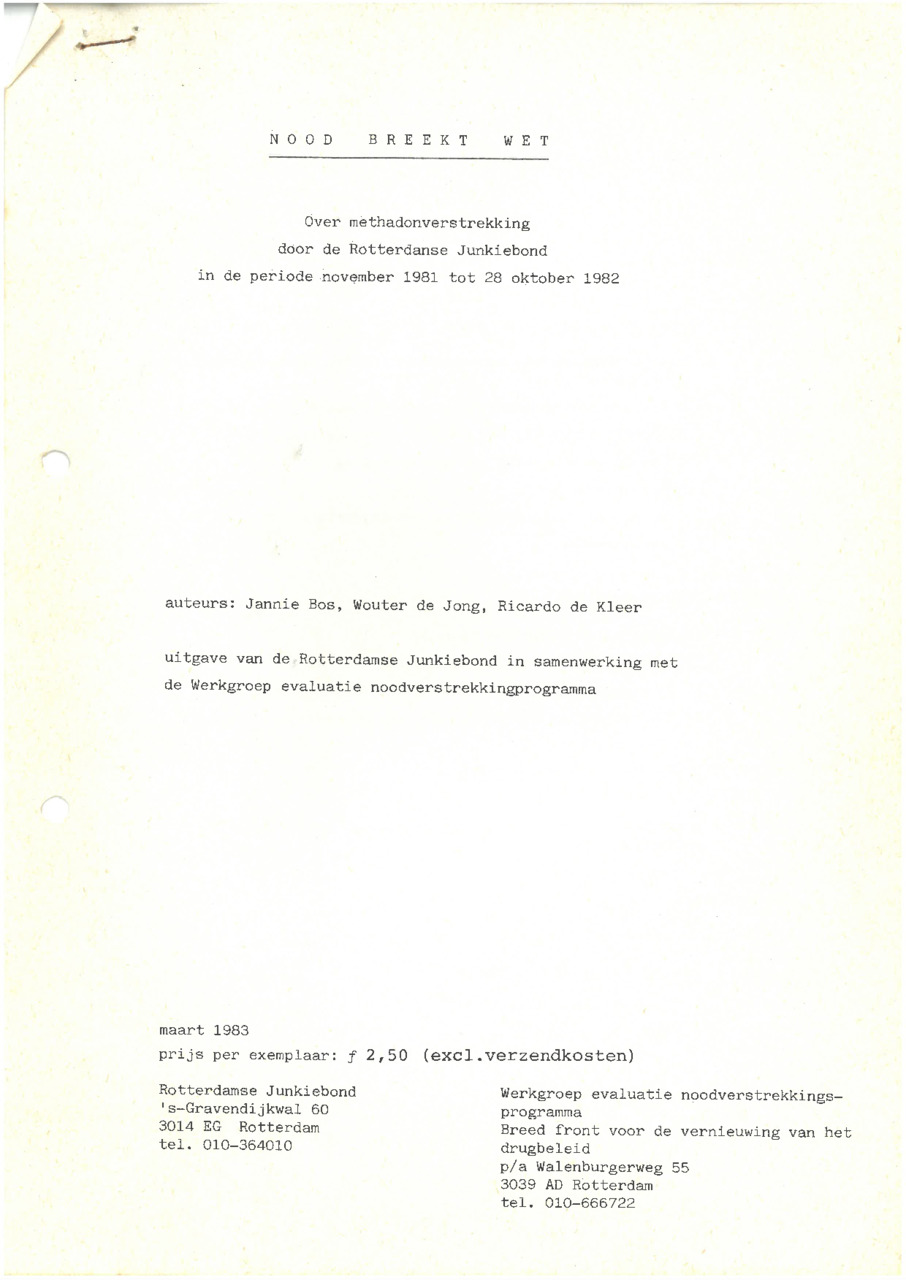The Methadone Emergency Program
In 1981 the Rotterdam Junkie Union organized a guerilla methadone program. The junkies wanted to offer an emergency provision of this synthetic opiate to the large number of destitute heroin users in the streets, who often suffered acute withdrawal symptoms when they did not have the means to buy heroin. In their report, published in 1983, they explained their efforts in detail.

Report on methadone distribution by Rotterdam Junkie Union 1981 - 19821983
A report on the methadone distribution by the Rotterdam Junkie Union, a project that ran from November 1981 to October 28, 1982
Rotterdam Junkie UnionMethadone was introduced in Holland during the late 1960s for the small number of people who had started to inject opium. At first, these programs were quite liberal and non-committal, but as the heroin epidemic started to spread after 1972, the methadone programs were transformed into stricter reduction programs.
Ever since its foundation in 1980, the Rotterdam Junkie Union had argued for an unconditional supply of methadone. In their report on their guerilla methadone program, the union explained that they signified two problems with methadone distribution in Rotterdam. First, there was not enough capacity to serve all the users. Second, aid providers had the strict philosophy that methadone should only be provided to support abstinence. Methadone distribution therefore involved many rules such as urine testing, a prohibition of the use of other drugs, limited opening hours, and an obligation to partake in a reduction program or psychotherapy. In practice many users could not meet these demands, and therefore ended up with severe withdrawal symptoms.
The Union initially sought to change the minds of policymakers about the supply of methadone. They had several conversations with local health authorities and policymakers, interviews on the radio, as well as several activist approaches such as the occupation of buildings. When these strategies failed, they started the emergency methadone program.
For their emergency methadone program, the Junkie Union found a local pharmacist and doctor willing to prescribe methadone. Subsequently, two union members constantly carried an emergency stock, which they handed out to drug users whom they encountered in the streets, in buses or in trams, at any time, day or night. The union supplied methadone to approximately 265 heroin addicts between November 1981 and October 1982.
The users part of the emergency program had a variety of reasons for needing methadone. Some were on the waiting list for a treatment program, some had been kicked out of a program, others were not in a methadone program at all, or they had missed the day their program distributed methadone. Demand outweighed supply, as the union encountered that with 300 pills per week they still did not have enough for all the users in need of methadone.
Initiatives such as the emergency methadone program were strongly discouraged at the time by institutions for addiction treatment, by the Royal College of Pharmacists, and by governmental health inspectors. They feared double prescriptions and overdoses. The guerilla project therefore had a short life once it went public in 1982. The regional health inspector quickly ended the program in October 1982, and prohibited the pharmacist and doctor from prescribing methadone for this purpose.
Despite the program’s rapid ending, in the course of the 1980s, methadone prescription steadily became more common, and by the early 1990s, methadone had become a cornerstone of Dutch addiction treatment. In part, this was the result of the lobbying by the drug user groups of the 1970s and 1980s, of which the efforts by the Rotterdam Junkie Union are a good example. Junkies closely cooperated with the local Municipal Health Services, with sympathetic general practitioners, and with volunteers and professionals who were experimenting with an alternative kind of addiction treatment. Together, they made a strong plea for an acceptance model in drug-addiction treatment, with low threshold methadone maintenance. Certainly, this had an impact on local and national policy.
Selected newspaper clippings on the Methadone Emergency Project (in Dutch):
- • Het Vrije Volk, April 24, 1983. Available from: https://resolver.kb.nl/resolve?urn=ddd:010961360:mpeg21:a0291
- • De Volkskrant, April 21, 1983. Available from: https://resolver.kb.nl/resolve?urn=ABCDDD:010878552:mpeg21:a0213
Scientific literature
- • Blok, G., Dinges, M., Jütte, R., and History. “The Politics of Intoxication. Dutch Junkie Unions Fight against the Ideal of a Drug-Free Society, 1975-1990.” In Medizin, Gesellschaft Und Geschichte : Jahrbuch Des Instituts Für Geschichte Der Medizin Der Robert Bosch Stiftung. Beihefte, Vol. 39. Steiner, 2011. Available from: https://heroineepidemie.nl/wp-content/uploads/The-politics-of-intoxication.pdf